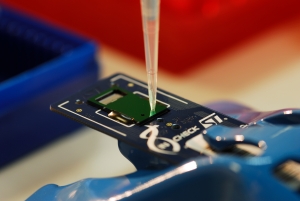Chipping away at avian flu

update SINGAPORE--STMicroelectronics and local medical diagnostics research company Veredus Laboratories launched Monday a chip capable of detecting and identifying within two hours, major types of influenza, including the H5N1avian flu strain.
The new VereFlu chip combines two existing molecular tests--Polymerase Chain Reaction (PCR) and microarray--a "world first", according to Veredus CEO, Dr. Rosemary Tan. The integration of the two current testing technologies into a single test makes the detection "very sensitive and accurate", she said.

VereFlu is designed to detect Influenza types A and B, of which the former is an avian virus that has crossed over into mammals. Dr. Tan noted that there are currently many different strains of Influenza A, with mutations constantly taking place. Worldwide, those that die from flu average between 250,000 and 500,000 a year.
"It's a challenge to know which strain will be the next pandemic strain, so it's essential to have a test to quickly detect and have knowledge of what type of flu [exists] in a short time," she pointed out.
Inkjet printer technology used in VereFlu |
Apart from the VereFlu silicon chip, other components in the testing system known as the ST In-Check Platform include a Thermal Control System, optical reader and ST In-Check software to generate reports and complete analysis. The microarray panel can also be updated with DNA sequences of new mutations.
The cost of the VereFlu test is comparable with other existing tests in the market, Dr. Tan said, but she declined to give specifics. It is understood that a single PCR test is priced around S$100 (US$72), including specialized labor costs for testing.
The level of automation and portability of the detection equipment allows for usage beyond laboratories and hospitals to clinics, airports, border checkpoints and even the home, said Dr. Tan. The testing platform has already received sales orders and there are also talks, both in and outside of Asia, to deploy the technology, she added.
Since March 2007, Singapore's National University Hospital has undergone tests on VereFlu and the influenza detection testing platform. Dr. Raymond Lin, head of microbiology in NUH's Department of Laboratory Medicine, said the evaluation team tested the system with samples of known strains, but not with the H5N1 strain as it was not available. Non-influenza strains were also included into the evaluation to ascertain that non-flu viruses do not lead to positive results. Results showed test durations to be between 45 minutes and two hours.
In conjunction with the launch Monday, STMicroelectronics and Veredus also unveiled a joint Bio-Application Lab for the development of new biomedical applications based on the ST In-Check Platform.
Francois Guibert, corporate vice president and Asia-Pacific CEO at STMicroelectronics, said the company has some 10 engineers based in the Bio-Application Lab. He expects the number to grow to at least 30 within three to five years.